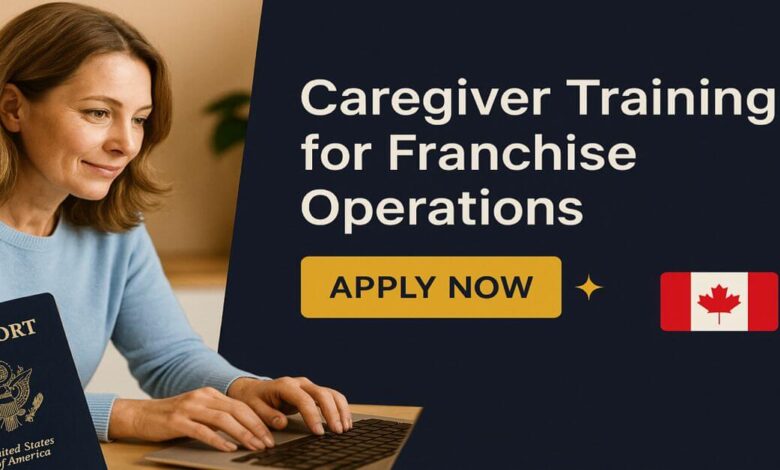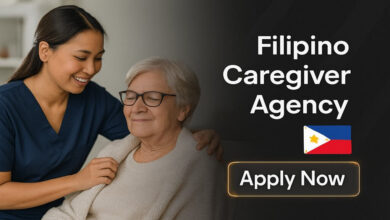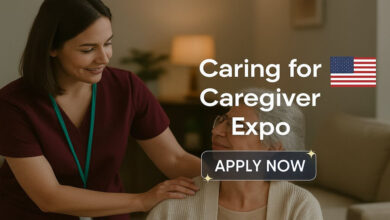
Caregiver Training for Franchise Operations 2025
The landscape of in-home care is undergoing a significant transformation. The combination of an aging population, evolving healthcare regulations, and growing demand for quality care has put caregiver training at the forefront of success for franchise operations.
In this dynamic environment, home care franchises must embrace comprehensive, scalable, and standardized training models to ensure consistency, compliance, and excellence across every location.
In this article, we’ll explore how caregiver training is changing in 2025, what franchise operators need to prioritize, and why investing in workforce development is a strategic imperative.
Growing Demand for Skilled Caregivers:
The caregiving industry is experiencing unprecedented growth. According to the U.S. Bureau of Labor Statistics, employment for home health and personal care aides is projected to grow 22% from 2022 to 2032, much faster than the average for all occupations.
At the same time, families are increasingly selective, prioritizing providers that deliver compassionate, competent, and consistent care. This puts added pressure on franchises to ensure every caregiver meets or exceeds professional standards — no matter the location.
Why Caregiver Training Matters More Than Ever in 2025?
1. Standardization Across Franchise Locations
For franchise operators, maintaining brand consistency is essential. A robust training program ensures that caregivers in New York deliver the same quality of care as those in Los Angeles. This consistency builds trust among clients and strengthens the reputation of the franchise brand as a whole.
2. Legal and Regulatory Compliance
With state and federal regulations evolving rapidly, up-to-date training helps franchises stay compliant with mandatory caregiver certifications, documentation practices, and health and safety protocols. Failure to meet these standards can lead to penalties, lawsuits, and reputational harm.
3. Reduced Turnover and Higher Job Satisfaction
Well-trained caregivers are more confident, perform better, and tend to stay longer with their employers. In an industry plagued by high turnover, offering clear training pathways and opportunities for advancement is a powerful recruitment and retention strategy.
4. Enhanced Client Outcomes
At the end of the day, training directly affects the quality of care provided. Trained caregivers are better equipped to handle complex medical conditions, navigate family dynamics, respond to emergencies, and build meaningful relationships with clients.
Check Also: Relative Caregiver Program Florida – Check Here
Key Components of Effective Franchise Caregiver Training:
A modern caregiver training program goes beyond basic instruction. Here are the essential elements franchise operators must include:
Core Caregiving Skills
- Personal hygiene and grooming
- Mobility assistance
- Medication management
- Nutrition and meal preparation
- Infection control and safety
Specialized Training Modules
- Alzheimer’s and dementia care
- End-of-life care
- Chronic condition management (diabetes, COPD, etc.)
- Mental health and emotional support
Soft Skills Development
- Communication and active listening
- Conflict resolution
- Cultural sensitivity
- Empathy and compassion in caregiving
Legal and Ethical Education
- HIPAA compliance
- Elder abuse reporting
- Client rights and confidentiality
- Professional boundaries
Technology-Driven Training: What’s New?
The integration of technology into caregiver education is reshaping how franchises scale and manage training across multiple territories. These are the most impactful innovations:
1. Learning Management Systems (LMS)
An LMS allows franchises to centralize training, track caregiver progress, and automate compliance reporting. It also enables the distribution of new modules when regulations change.
2. Mobile-Friendly Training Access
With caregivers often on the move, mobile-responsive training platforms make it easy for them to learn and review material on their own schedule, improving engagement and completion rates.
3. Microlearning and Video Content
Short-form videos and interactive modules help caregivers retain critical information more effectively than text-heavy manuals. Topics can include everything from proper lifting techniques to handling aggressive dementia behaviors.
4. Virtual Reality (VR) Simulations
Advanced franchises are beginning to implement VR for hands-on simulations of real-world caregiving scenarios, providing safe, immersive learning environments that enhance skill development.
Building a Franchise-Wide Training Strategy:
To establish a successful caregiver training framework, franchise operators should focus on the following strategic pillars:
1. Create a Standardized Curriculum
Develop a universal core training program that covers essential skills, policies, and brand expectations. Allow for regional flexibility where needed, but keep the foundation consistent across all franchisees.
2. Make Onboarding a Strategic Advantage
The first few weeks of employment are critical. Use onboarding as a way to welcome, educate, and empower new caregivers. Introduce them to your company values, code of conduct, and service philosophy from day one.
3. Implement Ongoing Education and Certification
Training should not stop after orientation. Offer continuing education opportunities and encourage certifications in specialty areas. This not only improves service quality but also motivates caregivers to grow within the company.
4. Collect Data and Improve Over Time
Use data analytics from your LMS and field observations to identify training gaps, caregiver performance trends, and client satisfaction levels. Continuously refine your training materials based on this feedback.
Caregiver Onboarding in Franchise Systems:
Effective caregiver onboarding in franchise systems lays the foundation for high-quality service and caregiver retention. A structured onboarding process helps new hires understand:
- Company mission and values
- Legal and compliance expectations
- Role-specific duties and client protocols
- Documentation and communication standards
- Use of care management systems and tools
Franchise systems benefit from standardized onboarding that ensures uniform training across all locations while maintaining local adaptability.
Caregiver Compliance Training:
Caregiving involves sensitive tasks and close contact with vulnerable populations. This makes caregiver compliance training essential for risk reduction and legal protection.
Key areas covered should include:
- HIPAA and data privacy policies
- Medication administration (where applicable)
- Infection control and hygiene
- Workplace safety and emergency procedures
- Elder abuse prevention and reporting
Regular compliance refreshers, checklists, and assessments keep your team aligned with both national and franchise-specific regulations.
Senior Care Franchise Education:
Senior care franchise education should go beyond just the basics. Specialized training for dementia care, fall prevention, and chronic disease support empowers caregivers to provide higher-quality care.
Offer tiered education pathways, such as:
- Entry-level caregiver orientation
- Advanced care certifications (Alzheimer’s, hospice, etc.)
- Franchise-specific customer service protocols
- Soft skills training (empathy, communication, time management)
Franchisees can boost brand reputation and reduce turnover by investing in continuing caregiver education.
Staff Development in Caregiving Business:
An often-overlooked growth driver is staff development in caregiving businesses. Ongoing skill-building and professional advancement lead to stronger teams and better care outcomes.
Some development strategies include:
- Monthly in-service training
- Leadership development for senior caregivers
- Online learning portals
- Peer mentoring programs
- Performance-based incentives for upskilling
Encouraging professional growth contributes to job satisfaction and operational excellence.
Healthcare Worker Franchise Models:
Successful healthcare worker franchise models maintain a balance between standardized training and the flexibility to meet local needs. This includes:
- Centralized LMS platforms for scalable training
- Mobile-friendly e-learning modules
- In-person and hybrid training options
- Certifications recognized across state or provincial boundaries
Well-designed franchise models integrate national healthcare requirements with operational consistency—especially when scaling to multiple territories.
Caregiver Skill Development for Home Care:
Your team needs more than heart—they need hands-on skills. Effective caregiver skill development for home care includes both technical and emotional competencies such as:
- Personal care assistance (ADLs)
- Transfer and mobility techniques
- Managing cognitive decline
- Cultural sensitivity and multilingual care
- Care documentation and progress reporting
Routine skill assessments and refresher modules should be part of your SOP.
Franchise Caregiver Standard Operating Procedures (SOPs):
Clear, well-documented franchise caregiver SOPs (Standard Operating Procedures) are vital for legal safety, client satisfaction, and service continuity. SOPs should include:
- Daily routines and shift duties
- Client intake and assessment processes
- Emergency response protocols
- Reporting and communication chains
- Cross-team handover documentation
Providing SOP binders or digital access to all caregivers ensures consistent delivery of care—even across shifts or locations.
Training Manuals for Caregiving Businesses:
Finally, every franchise should have detailed, up-to-date training manuals for caregiving businesses. These serve as reference guides for new hires and long-term staff alike.
Your manual should include:
- Introduction to the franchise’s mission and care model
- Caregiver roles and responsibilities
- Safety, health, and compliance procedures
- Communication standards
- Quality assurance practices
- Client interaction protocols
Whether digital or printed, manuals enhance knowledge retention and can be updated easily with new protocols or regulations.
Final Thoughts:
In 2025, caregiver training is more than a compliance obligation — it is a cornerstone of brand success, operational scalability, and client trust. For franchise operations, the ability to deliver consistent, high-quality training at scale will be a defining factor in long-term sustainability and growth.
By embracing technology, standardizing procedures, and investing in people, franchise owners can build a caregiving workforce that is not only competent but also passionate, professional, and loyal.
Frequently Asked Questions:
Can training be customized for different franchise locations?
Yes. Many training providers offer customized modules based on local regulations, client demographics, or specific care services provided by the franchise.
Why is caregiver training important for franchise operations?
Standardized caregiver training ensures consistent, high-quality care, brand reputation, and regulatory compliance across all franchise locations.
Is caregiver training required by law?
In many countries and regions, caregiver certification and training are required to meet health and safety standards. Franchise operators must ensure all caregivers meet legal and licensing requirements.




